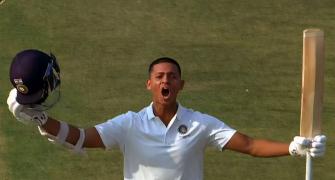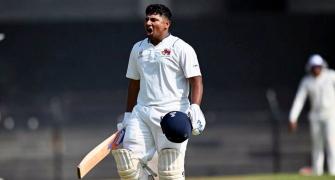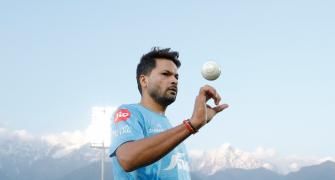'And how we can take Indian cricket forward, that's the only aim anybody should have.'

Indian cricket enters a busy season with several international assignments, including the 2023 ODI World Cup, coming up.
The team selection for the West Indies Tests generated much debate after several domestic performers were ignored. The current selection committee, which was without a chairman for five months after Chetan Sharma was removed, invited a lot of criticism.
The BCCI finally ended the impasse by appointing former pacer Ajit Agarkar as chairman of the selectors on Tuesday, July 4, 2023.
Agarkar, who took more than 300 international wickets in a decade-long career for India, also featured in 42 IPL matches from 2008 to 2013.
He faces a tough challenge as India gears up for the all-important World Cup at home later this year even as a few senior players are expected to be phased out in the next 12 to 18 months.
M S K Prasad, who was the chief selector between 2016 to 2020, oversaw the successful transition of captaincy from Mahendra Singh Dhoni to Virat Kohli, while India registered their first Test series victory in Australia during his tenure.
He also unearthed several players including Rishabh Pant, Mohammed Siraj, Prithvi Shaw, Mayank Agarwal, Hanuma Vihari, Shubman Gill and K S Bharat among others.
Former India wicket-keeper Prasad has simple advice for Agarkar: "You need to be dispassionate."
Prasad spoke to Rediff.com's Harish Kotian about the importance of the chief selector's role and how the national selectors work in tandem with the captain and coach with a common agenda to take Indian cricket forward.
The first of a two-part interview:
Having been the chief selector for a full four-year tenure from 2106 to 2020, what would be your advice for Ajit Agarkar?
It is simple. You need to be dispassionate about anything else and move forward with with certain goals in mind and just be uncompromising on that.
What is the difficult part of being the selector? Does a person need time to get settled down in the role?
It all depends on how much you are committed to the role. If you committed, you can get settled quickly.
It also depends on what kind of a vision you have, and what are your plans to move forward.
If you have these things in mind, obviously people get into the job quickly, because everybody played cricket and Ajit (Agarkar), especially, has played so much of international cricket, he has played so much of IPL.
So he's played enough cricket to understand the nuances of the game, only thing is, you need to have that clear cut vision for the future, which will make getting into the job will become easier.
The selection meetings are held behind closed doors and the fans never really know what happens or how certain players are selected. Can you take us through what takes place at a selection meeting?
Basically a selection committee meeting will take place with all the stats in front of you; it's a combination of all the planning that you had earlier, going forward.
Also, the management will also come up with their views through the captain. So it's a combination of all these things which help in selecting the side.

How important and how different is the chief selector's role compared to the other four selectors?
Basically, he is like a captain of the ship, or a captain of a team.
It all depends on what kind of vision that he has for the team, and how he is going to take forward, and how how he is able to push his team members towards his vision and his goals.
It's not just about his individual vision, it's about the team goals, the combination of both the team management and also the selectors, and also the BCCI.
Together, all the three parties (selectors, team management and BCCI) should have a common goal and a common vision to move forward and stick to that.
The most important thing is that if they have planned something, then stick to that plan... come what may.
You have worked with different captains and different coaches during your tenure. How important is the communication between the selectors and the team management?
It is the most important factor. The reason why I say that is because during our time, all of us had a wonderful wonderful association with Ravi Shastri, Anil Kumar and Sanjay Bangar, who was there for some time, we never had any issues with the team management because we were all aligned.
We might have differences of opinions, but at the end of the day, we need to come to a consensus where, where the common aim should be the team and the team interest.
Were you okay with having the captain as part of the selection committee meeting?
I have always believed that the captain should be a part of the selection committee, because at the end of the day, whatever the team that you selected it is the captain who will take those players forward. The captain also brings the team management's views to the table.
I believe that the captain should be very much part of the selection committee and also the selection committee being part of the team management, while we are touring abroad.
By having the selection committee part of the team management, you mean to say that the selector should also have their say in picking the playing eleven when the team is touring abroad?
I think so. Sometimes what happens is an outsider perspective might be a dispassionate one because at times you might take soft calls, because being a part of the team you don't want to hurt someone, or disappoint someone, whereas the selector's might be a different view, and it might be a little dispassionate view.
What happens is that a coach might work very hard on a player, and that player is not delivering, he will still want to prefer and give him (matches).
But whereas from a outsider perspective, then that guy (selector) will only think about the best possible eleven, keeping aside all these soft calls.
Sometimes you can't go so deep into it, but I always feel that, at any anytime, especially while touring abroad, the selector who is on tour should have the say in picking the playing eleven.
There must have been times when there are disagreements between the team management and the selectors. How do you resolve such issues?
There will always be disagreements. There is nothing wrong in having differences of opinions, but eventually, both of them will come down to a consensus in the larger interest of the country and larger interest of the Indian team.
The next couple of years are very crucial for Indian cricket. You might see a few senior players make way for the youngsters in the coming year or so, while the captaincy could also change hands.
You supervised the transition of the captaincy from Mahendra Singh Dhoni to Virat Kohli during your tenure as chief selector and also saw some young players coming in for the seniors.
How do you think Agarkar & Co should handle the transition period?
What we have to do is, we need to be selfless.
You need to be selfless, you need to cut down your emotions, and you need to think from a longer perspective and keep your personal interests aside.
The only one point agenda should be Indian cricket and how we can take Indian cricket forward, that's the only aim anybody should have.










